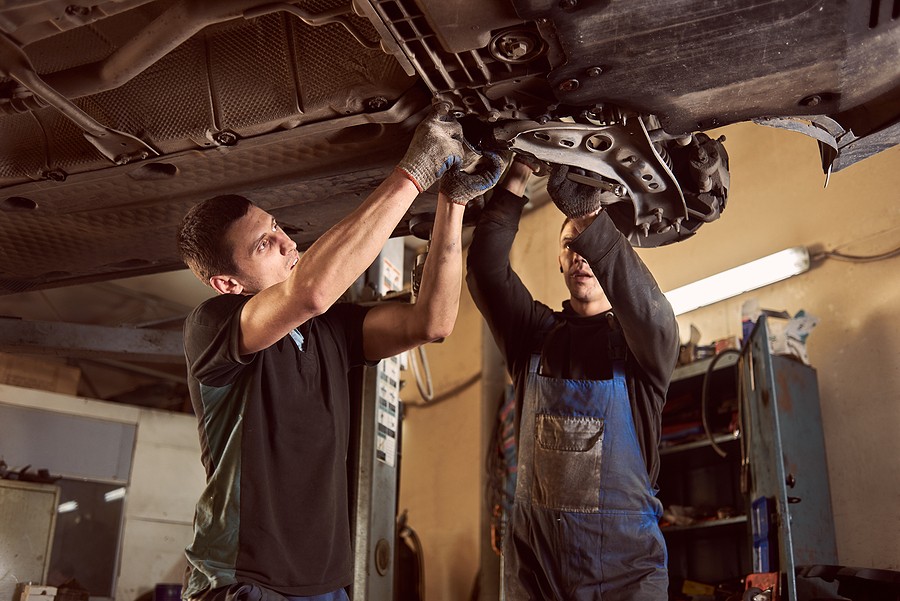If you're planning to visit an auto repair shop soon, consider these 10 tips for dealing with an auto repair shop:
- Familiarize yourself with the vehicles owner’s manual
- Decide on a dealership or an independent shop
- Organize your documentation
- Ask about the technician
- Check the mechanic's certification
- Ask about pricing
- Ask other questions
- Do not use aftermarket components
- Do not fall for the 100,000 miles tune-up
- Be alerted to red flags
Our vehicles are expected to have some breakdowns over time, and that's why visiting an auto repair shop will be a must occasionally. However, when you visit a pair shop, if it's your first time or hasn't done it frequently, it might sound like a challenging experience, especially if you don't know what to ask about and how to deal with all repair shop mechanics.
Dealing with an auto repair shop mechanic is not very hard or requires advanced experience. However, once you do it one time, you'll be able to do it much better the next time, and it's about practice.
If this is your first time going to their peer shop or if you hadn't had a good experience in the past, this article should support the tool. It provides you with 10 tips for dealing with an auto repair shop mechanic. This way, you know what you're looking for, and you feel confident about what you should be asking about without worrying about getting ripped off.

10 tips for dealing with an auto repair shop
One of the biggest concerns about going to an older shop is not understanding what needs to be fixed and getting ripped off by the payment. Many of us might feel surprised about the total number required and have no idea whether this number is accurate or not.
Auto shop mechanics are very smart, and they can tell immediately whether you have experience and you know what you're looking for or not. That's why unfortunately, many dishonest mechanics might take advantage of you and make you pay for unnecessary repairs.
1. Familiarize yourself with the vehicles owner’s manual
One of the most important tips and tricks you should implement before visiting an auto shop is familiarizing yourself with the vehicle's owner. The manual serves as the most important document about your vehicle.
It has detailed information about your engine's type, the different specifications, the transmission components, and even the exterior paint code. By understanding all these details, you'll know immediately when the mechanic is about to install the faulty component that your vehicle doesn't need.
You don't necessarily have to understand every detail about your car but learning one or two things about the vehicle occasionally helps you avoid paying for unnecessary repairs. It also showed that you have a certain level of understanding of your car, and that's an important element when negotiating with the mechanic.
2. Decide on a dealership or an independent shop
Before you visit the auto repair shop, you must decide between going to a dealership or an independent shop. The dealership typically has skilled mechanics specified in this specific type of vehicle. In other words, if you're driving a Ford car, you'll be dealing with mechanics who've been working on Ford vehicles for decades.
While visiting a dealership is a good option for dealing with significant damages, it might not be the best option if you're looking to do simple repairs like an oil change or probably a tire rotation. This is because dealerships' hourly pay rate is way more expensive than the small independent shops.
Therefore, you should be mindful about choosing between an independent shop versus a dealership depending on what you're looking for.

3. Organize your documentation
If you're planning to visit an auto shop, you must have all the documents prepared and organized. Maintaining all previous payments for any car repairs is extremely important because you avoid unnecessary repairs.
For example, if you know that you changed the vehicle's braking system a couple of weeks ago, you can't immediately tell the mechanic that your vehicle doesn't need new brakes because you changed them. This way, you avoid installing unnecessary brakes and paying for a repair your vehicle doesn't need.
4. Ask about the technician
The nice thing about going to a corner garage is that you can't have a one-to-one conversation with the technicians. Instead, you can ask about their level of experience to confirm whether they are willing to fix your vehicle's problems or not. So naturally, you want to select a technician who's capable of fixing your car without introducing any other damages that might cost you thousands of dollars down the road.
5. Check the mechanic's certification
If you don't already know, there is a common, typical certification for advanced mechanics, which is the ASE certification. This certification indicates that the mechanic has a good level of mechanical skill sets and has passed a specific number of years of experience.
In other words, the ASE certificate is a good indication that you're dealing with a highly skilled mechanic. This way, you don't have to be worried about whether this mechanic will fix her car or not.
6. Ask about pricing
Before you move any step further with fixing your car or calculating the total repair costs, you must understand the pricing. You can't ask general questions about the hourly. For example. You can then compare this pricing to other nearby garage repair shops.

7. Ask other questions
The only way to get the best experience out of the repair shop is to ask questions. Asking questions is not a bad thing it's one way to show that you need to understand everything and eliminates any chances for the mechanic to rip you off.
You can ask simple questions about what needs to be fixed and check why the mechanic decided to replace a certain component. For example, if you have this component replaced recently, you can then argue that the component didn't reach the end of its lifetime and why did the mechanic decide to replace it.
You can also ask other questions about the total repair cost in labor costs. For example, if you've asked about the hourly rate and realize that the total number on the bill is more than what you're expecting, you can kindly ask for an explanation.
8. Do not use aftermarket components
Often, a mechanic might offer to provide you with an aftermarket component just because they have it in-store, and he will explain to you that your component will be replaced immediately, so you don't have to wait a lot of time. However, most aftermarket components have their limitations.
Therefore, you must insist on using the original equipment manufacturer or what's known as the OEM parts. These parts are designed and created originally by the same manufacturer, and they typically fit exactly in the vehicle.
The biggest challenge for choosing the original equipment of manufacturer parts is the waiting time. In most scenarios, to wait for this part to be shipped to the dealership or the independent shop, and that's where the mechanic might take advantage of this and ask you to use an aftermarket component.
Aftermarket components are not recommended because they're not guaranteed to serve you at the right time. In addition, they have a lot of limitations in breaking down prematurely or causing other damages to these surrounding components simply because they're not compatible.

9. Do not fall for the 100,000 miles tune-up
There's a very common myth that many people believe, which is every vehicle needs to have two, not once every 100,000 miles. However, that's not true.
Therefore, when the mechanic offers you a tune-up as you reach the 100,000 miles, you should not accept it because all you have to do is follow its recommended in your vehicle owner’s manual.
That's why we highly encourage you to familiarize yourself with the manual, especially the part that focuses on how often you should do things. For example, the manual will have details about when exactly your vehicle is expected to have a tune-up, and that's what you must follow only.
10. Be alerted to red flags
Finally, be alerted to any weird warning signs or red flags. For example, if you realize that the mechanic does not look you in the eye or he speeds talks and does not provide you with details, you should walk away no matter what.
There are plenty of repair shops in every corner around your neighborhood, and choosing the closest one does not mean it's the best one. Therefore, if you're not comfortable with how the mechanic behaves, believe your guts and walk away because this is one way forward for the mechanic to hide things or make you pay for things that are not necessary.
How to choose the right auto repair shop?
Although it's important to understand the main tips for dealing with an auto shop, it is critical to select the right shop in the beginning. Let's take a closer look at some of the tips that will help you choose the right shop for you:
1. Explore the repair
Before you step further in looking for an auto shop, explore whether you can fix the issue yourself. Many of the car issues are very simple, and there are things that you can do on your own.
By investing in a small tool like the OBD 2 scanner, it will tell you immediately what's going on. It will throw an error that you can search for on the Internet and get an idea about what's going on.
You can also read online articles to help yourself do some of the repairs yourself without needing a mechanic. This way, you don't have to deal with the hassle of finding the right mechanic or understanding how to deal with them.
In many instances, once you go to the independent shop, all you get is introducing other things that are not true or dealing with other repairs that are not necessary. Of course, going to the mechanic is also a good chance to check for other problems, but unless it's a legitimate mechanic, it might be the other way around.
2. Search online
If you don't know of any auto shops around you, you can do a quick Google search. For example, you can look for an auto repair shop near me or independent mechanics near me.
You'll find a long list of potential repair shops because that's the case around the United States that every location should have some garage or independent shop.
3. Decide between dealership or independent shops
Keep in mind that not every car problem requires a dealership, but also there are certain car problems that a dealership must do. For example, if you're dealing with some major engine problems, you'd better see somebody who is an expert at the dealership rather than sacrificing the engine by going to an unskilled mechanic.
This, however, does not mean that all mechanics at independent shops are not skilled because, typically, those mechanics have been working with the dealerships for a very long time. Then they decided to open their shops. But most of them might be familiar with certain models and brands than others.
4. Check the customer's reviews
Once you find the list of potential auto shops committees a good idea to look at the customer's reviews, the last thing you want to do is go to an independent shop where customer service is not good. It's going to be a very frustrating experience.

10 tips for dealing with an auto repair shop: Final thoughts
Since visiting the auto repair shop will be a requirement for everyone who owns a car, you got to understand what you should know before negotiating or discussing with a mechanic.
This article provides you with 10 tips for dealing with an auto repair shop mechanic. Implementing these tips will achieve a successful negotiation process, and you'll only pay for what you need to.
If you realize that you're visiting the auto repair shop frequently, this indicates that your vehicle has significant problems making it beyond repairs. If that's the case, it might be the right time now to sell your car and take advantage of its value to buy a better vehicle.
Cash Cars Buyer is one of the top-rated car removal companies in the nation that guarantees to pay you the top dollars and provide you with free towing despite your living location around the united states.
Our process is very straightforward and doesn't take more than a couple of days to get your car removed safely and for the most money.
All it takes you is to:
- Describe your car’s type and condition
- Receive our instant free quote
- Accept the quote
- Get your car removed and receive your cash payment on the spot!
To learn more about our process and our teen, you can reach out to us by calling us at (773) 791-4363 or visiting our home page click on the free instant online offer.



